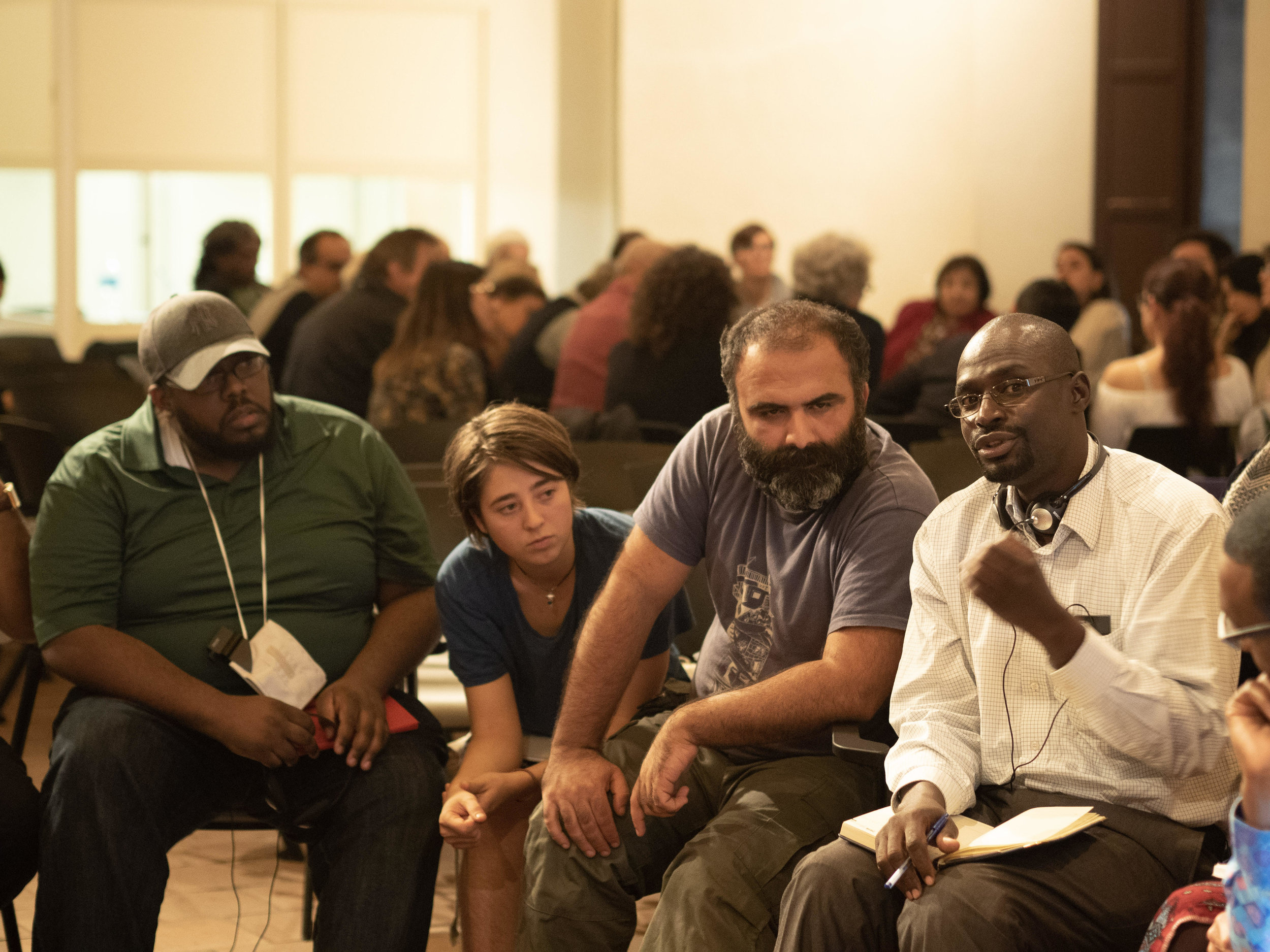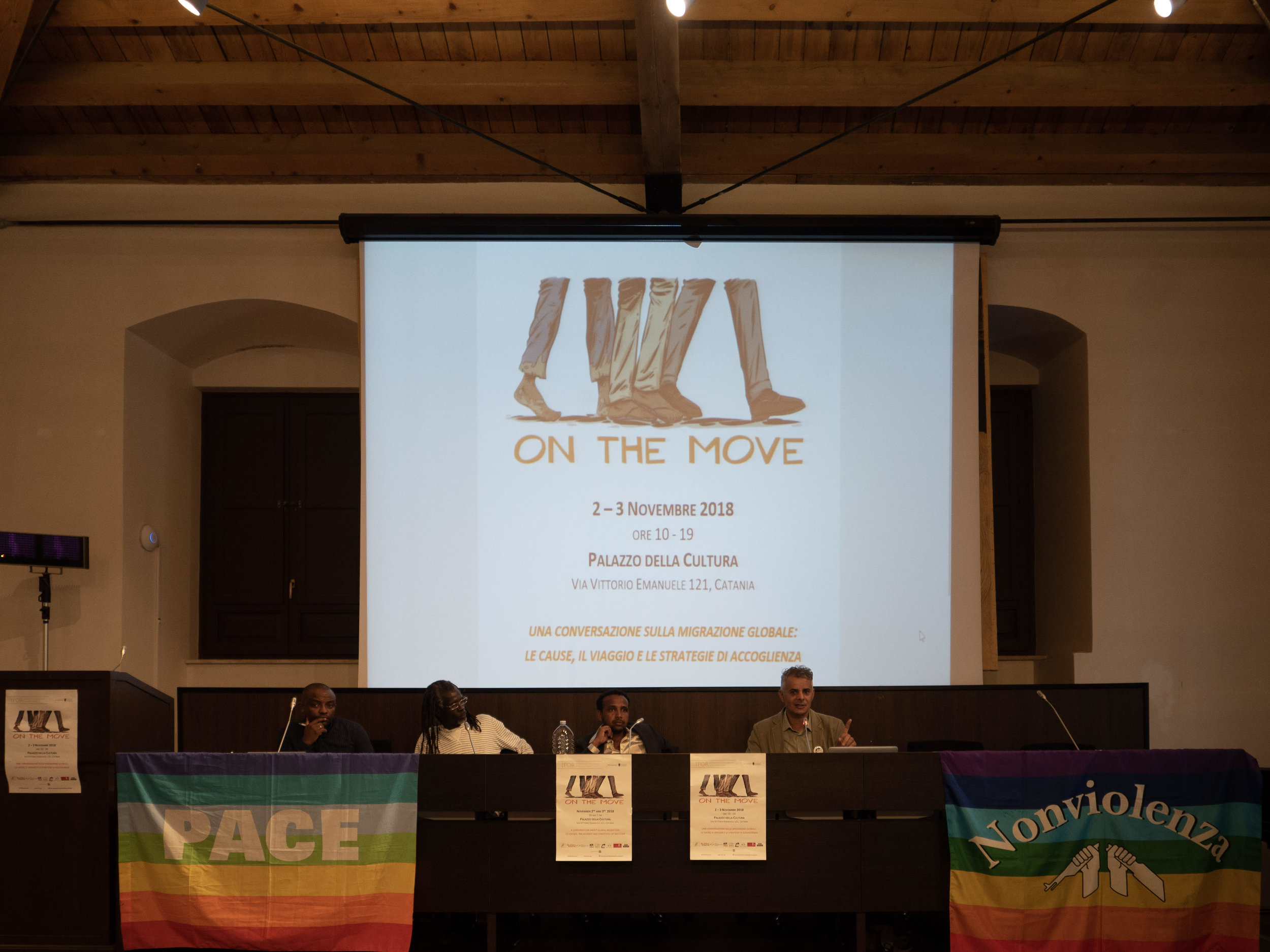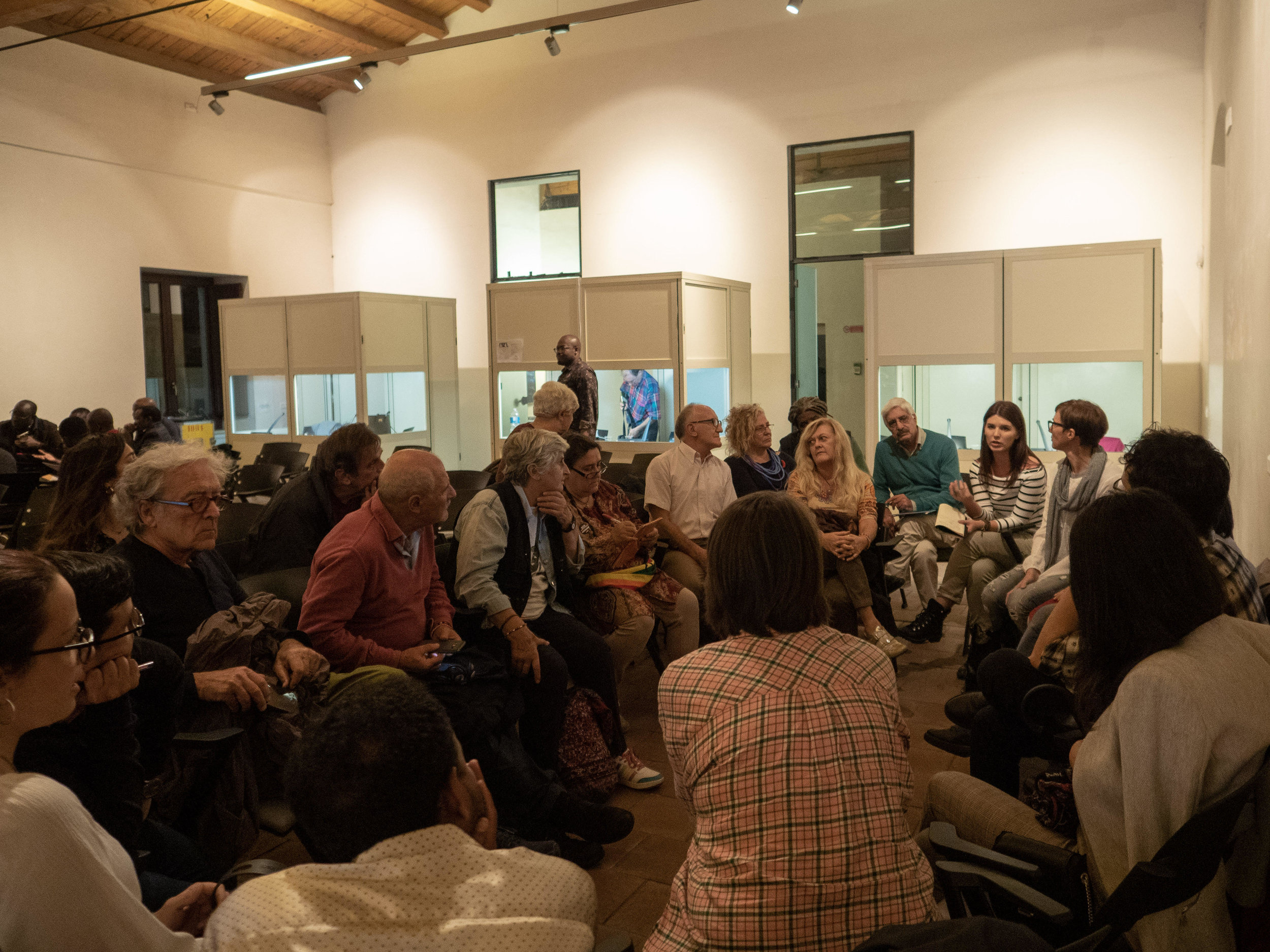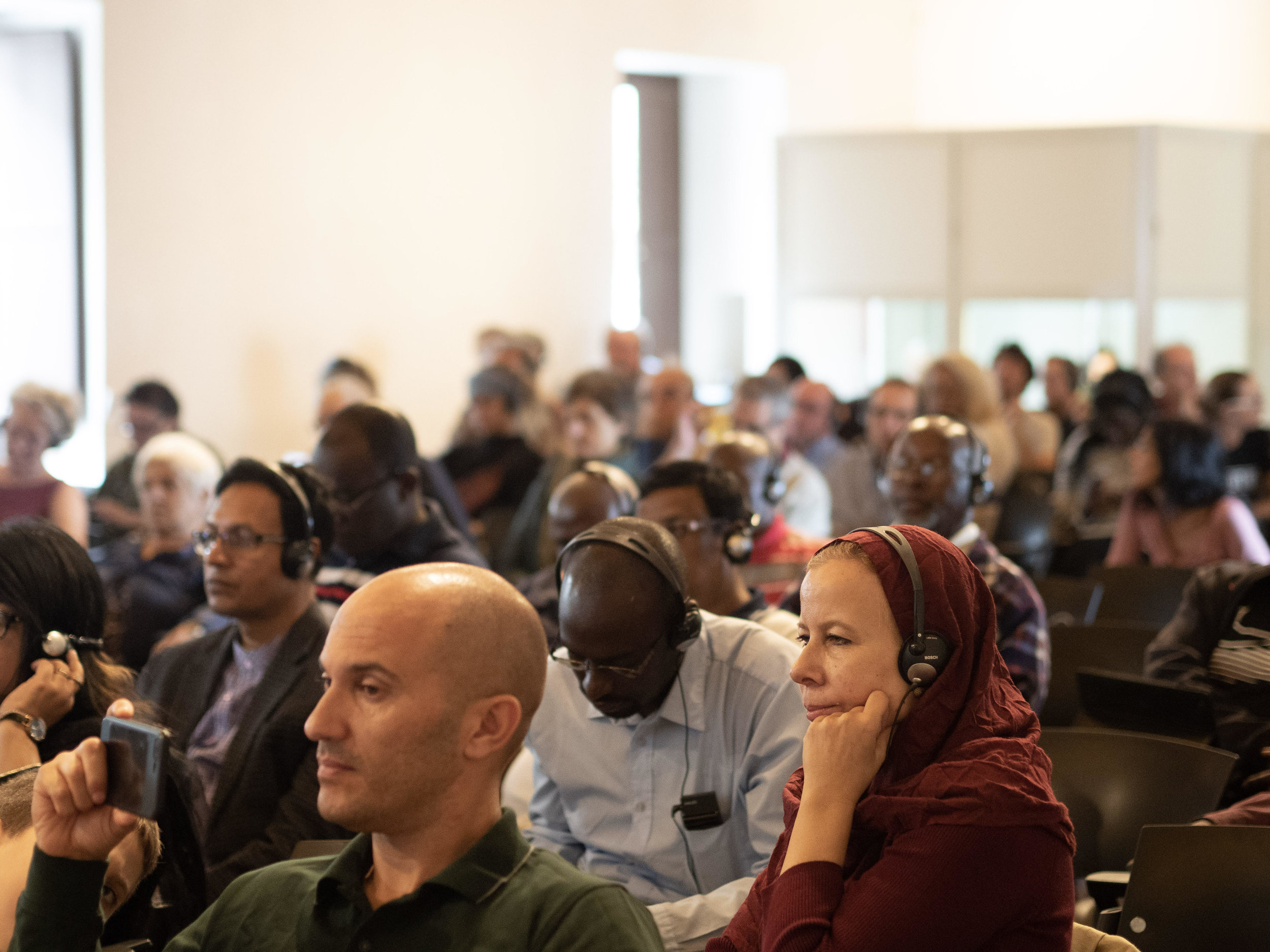A new conversation about migrants, led by migrants themselves




In November 2018 the International Fellowship of Reconciliation (IFOR), together with its Italian branch (MIR Italia), invited members, activists and interested fellow humans from over 40 different countries to join a «New Conversation about Migration» in Catania, Sicily. The conference, held on the weekend before the international Council of IFOR, had the primary objective of creating an open platform to talk with migrants, rather than simply talk about migration itself.
Therefore, the panels organized were focused primarily on the issues concerning migration causes, the individual experience of the journey and strategies of hospitality and interaction. Zaira Zafarana, IFOR UN Representative and member of MIR Italia, energetically coordinated and moderated the conference. The Conference conversations and contributions were simultaneously interpreted into English, Italian, French or Spanish to include as many participants as possible. By establishing a new way to converse and think about migration, the participants of the conference sought to develop a broader and more diverse perspective on the topic; to overcome the Eurocentric perspective often dominating the discourse on migration and integration politics in Europe.
Since the starting of the conference “migration” has been identified as a wider subject including different elements to be addressed. Many participants were puzzled yet intrigued by the diversity of migration patterns. For instance, most migrants worldwide are involved in internal migration within their region, moving to other cities or to neighboring countries. An idea that differs from the everyday understanding of South-North-immigration enforced by media. Throughout the conference 14 representatives openly shared their very personal and emotional experiences regarding their endeavors, as well as the life they left behind in their home country, often describing hopeless and painful pictures of degrading living-conditions.
Listening to these painful testimonies, hearing about the injustice and the inhumanity described, participants showed empathy, felt the disappointment about conditions lived and many were supremely moved. Nevertheless, the united efforts and strong will of people from all over the world, ambitiously advocating for peace, non-violence and solidarity, created a hopeful, energetic and confident atmosphere.
One noteworthy issue, among the already many compelling stories, was the alerting gap between the theoretical idea of human rights and their practical implementation. The experiences shared by the participating refugees and migrants demonstrated circumstances where their rights are not substantially protected and respected; instead the trend moves towards criminalizing migrants while people and organizations remain helping them.
Father Zerai, from the Habeshia Agency declared once again that: "The rights of the weak are not weak rights. The rights of the poor should not be poor rights.” Abdelfetah Mohammed an intercultural mediator migrated from Eritrea to Sicily gave a brief insight into his own story:
„I was moving from place to place for 11 years, which was not planned at all. I did not come straight to Italy. I moved when the violence became too dangerous … war is always waged against the people, therefore, living in conflict areas becomes unbearable. Most of the people flee within the region, since they hope to go back home as soon as the violence is over. No one wants to be a refugee.“
Another speaker was Junior Nzita Nsuami. He is a former child soldier from the Democratic Republic of Congo, founder of the organization "Paix pour les Enfants", and a goodwill ambassador for the UN campaign #enfantpassoldat. He has published an autobiography about his childhood experiences and because of death threats in DRC, Junior got asylum in Canada. Junior stated that children pay with their lives and lose their childhood while the European and US-American arms industry is profiting from wars fought in Africa and from child soldiers’ practice. He insisted that there is no positive war and that the only way to fight is in a non-violent and peaceful manner. Then, he concluded his speech with a forceful and urgent appeal towards the audience:
“The children pay the price of the weapons that Europe produces. I am African, but I would like to speak as a citizen of the world today. […] I urge you in Europe and in the USA: Stop with the gun production! You should know that in Africa we don´t have factories to produce weapons, they are all in Europe and the United States. Your factories will enrich themselves and your gross domestic product will rise. There are more than 300.000 child soldiers in the world – It’s enough! Nonviolence and education are the only ways for our world.”
During the Conference it became clear that the central problems connected to migration are war, global injustice and human rights violations, all brightly debated by the audience throughout the conference. The current situation in Europe was often criticized and the European Union’s credibility called into question, one crucial example being that although the EU declares respect for Human Rights and their promulgation as one of its core values, the political practice often is in contrast. The island of Sicily, where the conference took place, is a vivid example of these practices: FRONTEX, the agency for the "protection" of the European external borders, is based in Sicily. The restrictive European policy endangers migrants, asylum-seekers and refugees who are thus risking their lives in reaching out for help. It’s time to begin rethinking the entire concept of borders and belongingness in the Mediterranean; a more distinctive vision was proposed by Runbir Serkepkani from the “Christian Peacemaker Teams” in Greece:
“[The Mediterranean Sea] is militarized. We need to remember that the Mediterranean is a sea that is connecting hundreds of cultures, and languages, and people, all having a connected history. What’s happening is injustice and what’s happening needs to change. Mediterranean is not “Mare Nostrum” it’s “Mare Liberum” - it’s the “Sea of Liberty” and we need to remember that.”
One of the biggest lessons drawn from the Conference on Migration was to dissolve the Eurocentric perspective on migration, as well as the racist and post-colonial structures influencing the modes the issue has been discussed. Therefore, we should be listening to refugees and come together and talk with migrants as with people within sources like #OnTheMove in order to find appropriate and adequate solutions.
A thriving example of solidarity and integration was presented by Roberta Ferruti from ReCoSol - Rete dei Comuni Solidali (Network of Solidary Communities). She spoke about Riace where the Italian community took in and integrated refugees that stranded at their shore in 2003. Today the model is replicated in over 40 Italian communities and inspired projects in seven other European countries. Although Riace lost financial assistance by the government and faces financial and political difficulties the community fights for the project’s persistence. In this light, Ferruti insists that solidarity can never be a crime and advocates for civil resistance and if necessary civil disobedience to preserve human rights and human dignity.
During the two days Conference, there was a dinner shared at Misericordia Mosque, which gave way for encounters and interactions between participants to the conference and the local Muslim community of Catania. The Conference concluded with an inspiring and exciting concert, where participants, together with other locals, enjoyed the rhythmic beats of the migrant’s bands Jhonny’s Family Project and Ciauda and were dancing until late in the night.
For the Spanish version click here
For the French version click here
